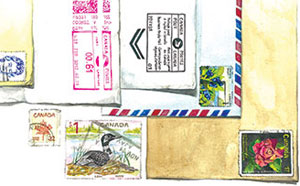After wheeling a trolley stacked with doughnuts and juice boxes to her desk beside the depot’s hive-like sorting area, my supervisor calls a meeting. Wary as a possum, I nose out from my cubicle of slotted plastic walls, curious about what price I must pay to lay my paws on a sour cream glazed. A few of my fellow letter carriers remain where they are, riffling through the day’s allotment, each pair of feet pivoting this way and that on a rubber anti-fatigue mat. She beckons again, and then a third time. “Sometime this year would be nice!” she finally yells, and the laggards drift forward. She narrows her eyes at them over the bundle of employee surveys she holds to her chest.
“I know, I know—make it quick,” she says. “It’s easy; you’ve done it before. They want to know how you feel. Is everyone pleased to be here today? ” Her sarcasm vanishes as she distributes the fourteen-page beast (seven in each official language). The company is putting us on notice, she says. Delivery exceptions are up, customer complaints are up—everything is up except mail volume. She returns to her strategic post between us and the doughnuts, then points to the ceiling: “They don’t want to hear the excuses anymore.”
For emphasis, her arm remains erect, and I gaze up into a haze of tube lighting. Closed-circuit cameras suspended among the steel girders stand in for the hierarchy of anonymous managers we are meant to fear. To my mind, the simpler, more cost-effective approach would be to appoint a single overseer, someone so intimidating the mere idea of him inspires improved work habits. Imagine, say, if above every supervisor’s desk hung a portrait of Chef Ramsay from Hell’s Kitchen, flames licking his glare. And I suppose, as I flip through the booklet—“I am optimistic about the future of Canada Post: tend to agree or tend to disagree”—that this is my big chance to speak up. A few years ago, I suggested that management lobby the federal government to add a second Christmas season to the calendar; since holiday revenue is so reliable, why not double it? Santa could be recast as a sunburned cottager in the fallow period after Canada Day. I never heard back about this, perhaps because I left my survey unsigned.
Instead, the company is implementing Postal Transformation, a campaign to modernize equipment and technology while “streamlining” the delivery model. First rolled out in Winnipeg two years ago, the program will reach across the country by 2014.At the heart of the revamp lies enhanced machine sequencing of the mail: letter carriers (or “delivery agents,” in the new parlance) will spend less time sorting and more time delivering. Since they now take responsibilityfor all duties in their geographical areas (delivering parcels as well as regular mail, and collecting outgoing mail from street boxes, small businesses, and retail outlets), they are equipped with personal data terminals, which enable management to know where they are (and where they are not, as yet), how busy they are, and whether they are seeking loopholes in the new design. And if they resent that the job has grown more gruelling than it used to be, well, having one’s obsolescence deferred comes at a price.
Though overdue for a cigarette, my supervisor wants to finish her address memorably. The very brand is at risk, she says: “Our service is failing because everyone’s in a hurry.” The doughnuts disappear in a flurry of elbows, and I’m left with a Tetra Pak of grape juice. We are couriers told to slow down, paranoiacs advised to be watchful. And, on the day when the company is assessing employee morale, we are scolded like toddlers. I poke a straw into my drink and start sucking, hoping to wash down all the irony.
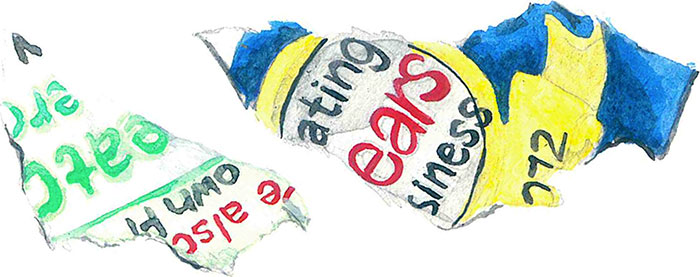
“i don’t suppose you’re going to enjoy the heat much,” says a woman waiting for me on the steps inside a tenementlobby that smells of urine and ineffective cleanser. “I mean, whenever it gets here.” Round, curly haired, wears big eyeglasses—she is always waiting for me. She subscribes to every sweepstakes and pseudo-religious scam going: A secret parchment left by your ancestor led me straight to you! Opening this letter will trigger a miracle. Her disability cheque seems to interest her least of all. What she has created for herself is a daily pursuit, a pile of solicitations to root through, every piece calling out to her alone. She accepts today’s stack with a satisfied nod. On different occasions, she has told me about her back pain, how the discs are mashing together, and she starts to describe how, on a given afternoon, she will put off using painkillers as long as she can.
“I think of other things,” she says.
“I should keep moving,” I say. We are assigned no time value for assuaging the isolation of strangers. Fortunately, she accepts getting cut short as part of our relationship. With the hand that is free of mail, she grabs the railing and begins to work herself upright, saying her “story” is about to start anyway.
To persist in good health, every institution requires a little romantic thinking (consider the military, or marriage). So here goes: Canada Post is one of the country’s largest employers, and the letter carrier is an envoy of the Canadian people. He knows your name before he meets you. If he has a parcel, he hopes you’re home and that you’ll come to the door; it saves you both a trip to the retail outlet. Tourists appreciate him because he has the neighbourhood memorized. Young children are partial as well: like the firefighter and the crossing guard, the letter carrier is one of the uniformed characters that help ground kids in a world they don’t wholly understand.
Nonetheless, last summer’s work stoppage was not exactly a public relations boon for me and my colleagues. While the Canadian Union of Postal Workers remains wary of what the Postal Transformation initiative will mean for its members, labour relations at the post office are strained at the best of times, and rotating strikes led to a lockout that culminated in back-to-work legislation. As it tends to, the blogosphere clogged with invective: Slobs and derelicts, the lot of them. Greedy slackers. Trained monkeys… It is true that nothing beats a banana for a fast, healthy snack. I eat them while swinging onmy key lanyard between apartment panel boxes.
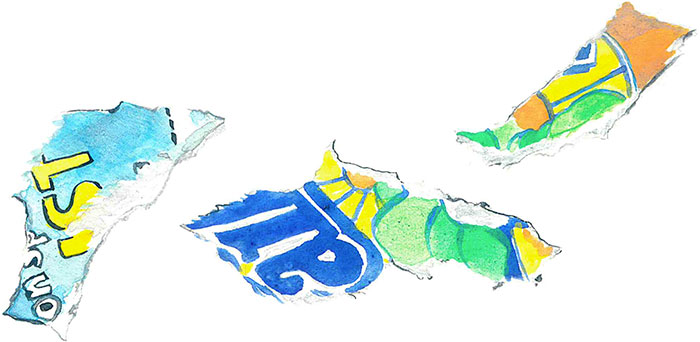
Sweat stings my eyes, but there’s nothing I can do. In my right hand I hold mail for the next several houses, and in my left a parcel the size of a shoebox addressed to someone a few doors down, an item that couldn’t fit in a satchel laden with assorted small packets, four sets of Unaddressed Admail (or “junk,” as it’s known to the consumer), and more mail. At least the clasp of the next gate is busted off, so I don’t need to finger it open. Because I know its pitfalls, I’m almost fond of this particular point of call. The owner has let his cedar hedge go bouffant. I have to turn and plow sidelong through the billowed leaves. One of the stone stairs is a mess of loose shards, and on my first day I was sent onto the stoop in a skydiver’s pose. Now I put my weight on the broken stair with the caution of a tightrope walker, all the while thinking I’ll someday discuss options with an arthroscopic surgeon, will be told after the fact about the tolerance of knees.
Despite the risks, yes, sometimes there’s an impulse to rush. For example, when I need to use thetoilet and am still a dozen stops from the café whose proprietor lets me use his, whether or not I plan on purchasing one of his feeble Americanos. Or when a light April rain suddenly becomes torrential and I speed things upto wait it out in my new, zippy (i.e., economical) Ford Transit Connect.
While everyone’s working day consists of a sum of minutes, letter carriersare able to beat the clock, or we can try to. Our sole task is to deliver the mail; once we’re done, we’re free to go home. Eight hours’ pay, no matter how long it takes. Of course, CUPW officially discourages us from skipping rest periods, in part because it makesslips, trips, and falls more likely, but mainly because the speedy worker ends up devaluing his work. If he can do so much so fast, surely he can do more… Among its many planned efficiencies, Postal Transformation consigns the five- or six-hour route to myth. And although “cakewalks” are being eliminated, we have seen no equivalent drop in the number of particularly long or voluminous routes, also known as “pigs” or “widow-makers.” Route measurement, we are told, is necessarily an imperfect science.
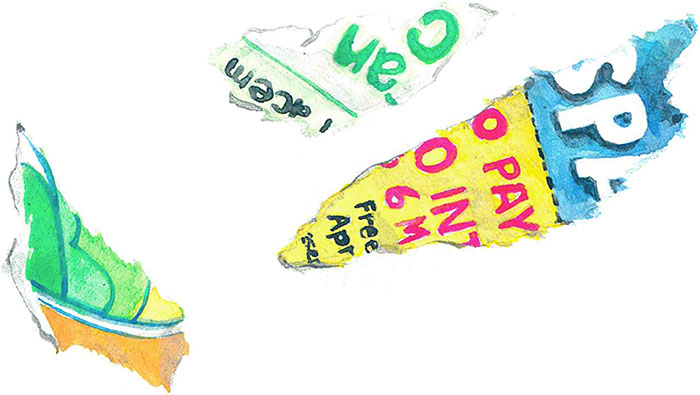
The federal government used the lockout to cast doubt on the relevance of paper mail: Modern post? Talk about an oxymoron! But when businesses large and small grew impatient with the dead-end negotiations and letter carriers were forced back to work, the government had no trouble with its about-face: Okay, so maybe the mail still matters—but just barely! Canada Post presents a unique quandary for its owner, which stumpsad nauseam about the need to create jobs, and so must resist slashing them while somehow lowering the cost of its massive delivery infrastructure. I shouldn’t have been surprised when, after being told our positions were safe, we were forced back witha lower wage increase than the one tabled by management.
What constitutes a fair wage for moving things from point A to point B? The janitor at my depot never looks anyone in the eye as he buffs the tile or consolidates garbage. He may just be glum by nature, but I have a hunch he’s miffed that schmoes like me pull in $24.39 an hour doing what we do. My duties, like his, are honest and straightforward, and it’s exactly that plainness of task I find appealing. If the work is often demanding, it’s never complicated. And while a few of us resemble the quirky loners of cultural lore (think Cliff Clavin from Cheers, or Seinfeld’s Newman), the truer simplification is that letter carriers enjoy unparalleled independence. Unless there’s a hiccup in your route, you need never speak to the boss. Organize your mail, and hit the street. Perhaps naively, I didn’t realize that a typical day would feature so many meaningful, if transitory, encounters (most of them occurring outside the depot). I was in it, at first, for the job security, and for the fair wage.
Of late, I can’t afford an average life—which, as concerns go, could not be more average. Every second Sunday, I pack the family into our increasingly sluggish Dodge Caravan and head for Boston Pizza. Looking around during the heavy, unspectacular meal, I wonder if the worry-free middle class I’ve heard so much about is eating at another restaurant.
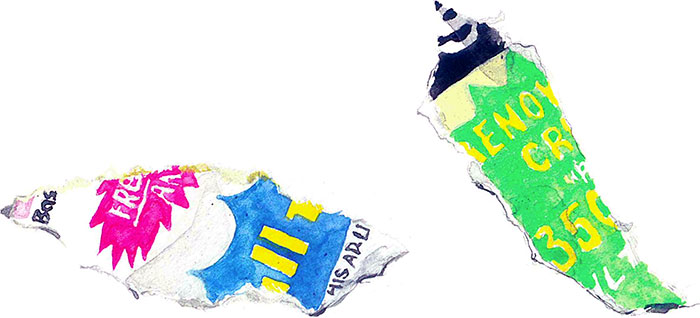
I’m driving along a shortcut through the domain of another carrier. A man with electrified tufts of greasy black hair steps out from between two parked cars and shows me his palms. I hit the brakes. He scowls through the windshield—one of his eyebrows is divided with scar tissue—before coming around to the driver’s side window, which I’ve foolishly lowered all the way.
“What time is it? ”
“Thirteen forty-five,” I answer.
“Thirteen? What? ”
I don’t mean to be difficult. We do operate on the military clock. “Almost two,” I say.
“I wait,” he says. “I’m here waiting. Two days ago, it comes at eleven; yesterday, it was like three; today…”
“We do our best,” I say.
“Bullshit! You don’t care about me!”
I fake a scratchto wipe his spittle from my lips. He says he has had cheques stolen, but then maybe they never arrived in the first place; how’s he supposed to know? His mailbox is busted, and Canada Post isn’t returning his calls, and his landlord couldn’t care less…
While letter carriers have a special relationship with the destitute, it’s not only the poor who are needy for the things we bring.
On one recent day, I covered a section of a walk that stretches into a wealthy enclave. Near the end of my tenth hour, I was on my knees outside a burnished oak door, pushing mail through a thin brass slot with the word “letters” embossed on it. The Lands’ End catalogue was foldable, and served as a handy ramming tool for other items half-stuck. Lastly, I held a corpulent, plastic-wrapped issue of Vogue, which didn’t stand a chance of arriving on the other side. As I was about to set it on the welcome mat, the door swung open. “This is much too late,” said the owner of somecozy-looking suede moccasins. I held the magazine up to her and stammered an apology. Her frown suggested that my supplicant’s pose, while predictable, was unbecoming.
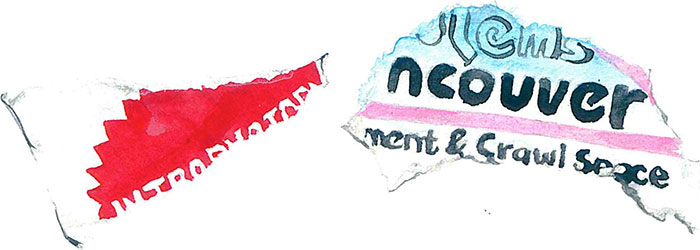
Rumours abound in volatile times: I’ve heard that our president and CEO Deepak Chopra is not of the flesh; he’s a supercomputer floating on a cooling barge in the Atlantic Ocean. A forthcoming algorithmwill solve the problem of having to deliver to every address (a guarantee enshrined in the Canada Post Corporation Act of 1981), in a country growing by 100,000 registered addresses a year. A creepier tale has to do with the returns incinerator. Upon screwing up a third time, letter carriers are assigned to their depot’s sub-basement. Next to a massive hearth furnace sits the heap of rejected or undeliverable mail, plus surplus junk mail. Scorned employees are given a short-handled shovel and told to get at it; after that heap comes the next (the in-house heat helping new delivery facilities to meet LEED standards!). Sometimes, as I sort, I think I hear grunts through the vent, and I picture flame light flickeringon cracked mortar walls.
The ongoing restructuring aside, further contraction in the postal service appears inevitable. Even the fieriest union official would concede, under duress, that electronic communication is eroding the bottom line. It’s the ugly math of modernity. Largely due to the work stoppage, Canada Post finished 2011 in the red. And Postal Transformation is being implemented with $2 billion of borrowed money (a federal loan, so I trust the company is paying a competitive interest rate). Then there’s the worsening pension deficit…
Fortunately, consumers won’t stop buying stuff that requires delivery at a competitive rate. And there will always be paper essentials: passports, notarized contracts, notices to appear in court. The junk isn’t going away either: how many of us use the Internet to find out which grocery store has a door crasher on brick cheese?
So when they ask if I’m optimistic about the future, I think I must be, because sometimes I imagine one. Perhaps, in 2025, things will be even more streamlined: from the comfort of a hydrogen-powered hovercraft, the carrier will launch mail to boxes with some kind of precision bazooka… I’ll be out of the service by then, which is not to say I don’t care. I hope my shoes will need to be filled. The walk to each door puts a little humanness into the machine; there’s pride and even contentment in delivering with care. Every day, I have a chance to do something ordinary, perfectly.
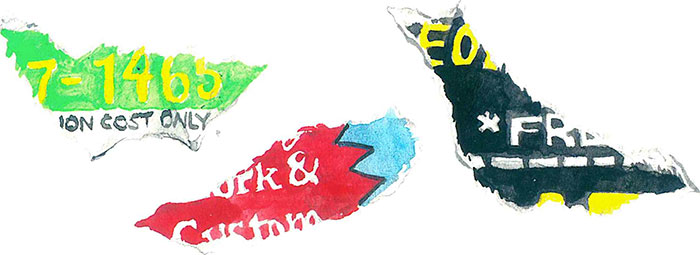
I’m in the elevator of a low-rent high-rise, lugging a full satchel of mail while balancing a disco ball on my head (sometimes the parcel says what’s inside). We haven’t reached the prescribed limits (907 kilograms, or twelve persons), but we’re full up nonetheless. A heavy-set man in a motorized wheelchair is facing me where I stand against the back wall, and he’s clearing his throat incessantly. A teenage girl in sunglasses is trying to settle the pair of Yorkshire terriers at her feet. Huddled by the control panel, two schoolboys are playing rock, paper, scissors. At my left is an exterminator, ventilator mask loose at his neck, gloved hands on the canister of poison.
As we climb, the floor indicator above the door flashes numbers out of sequence—8, 12, 6—a harmless psychedelic montage, I think, until the elevator shudders to a halt. No one seems apprehensive. The dogs fuss a little, but they were doing that already. Though I’ve had a long day and the disco ball is straining my neck muscles, I try to be as nonchalant as the crowd, which obviously trusts that the machinery will any second now work out its own kink. The man in the wheelchair has a twinkle in his eye and gestures to the box on my head: “That for me? ” We exchange grins. Maybe I’m affected by the cab’s dwindling oxygen, but I find the cramped, cosmopolitan scene strangely reassuring. If the letter carrier is not a modern creature, perhaps he is post-modern: he’ll continue to belong insofar as the future will continue to resemble what we already know. As the boys start a new round of their fist game, the exterminator takes off one of his gloves to troll for a better song on his iPod. For the time being, I feel central to a party.
[breakline]* The author’s name has been changed to ensure his anonymity.
This appeared in the May 2012 issue.

